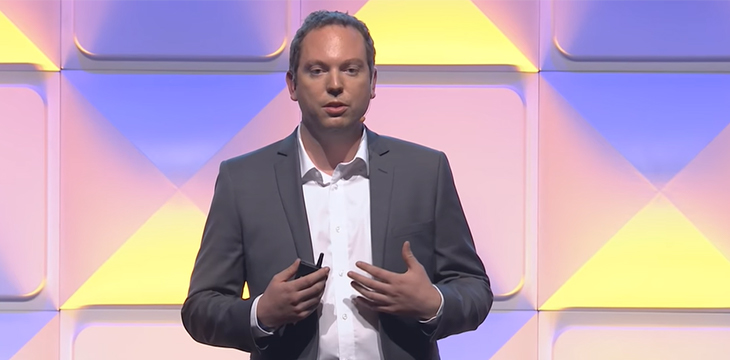|
Getting your Trinity Audio player ready...
|
Contracts are a cornerstone of doing business; but despite their importance, contracts have not evolved much since their inception. Doing business that requires a contract often requires a lawyer and a filing cabinet—expensive, time-consuming, and often inefficient resources; these are just a few of the reasons that Tokenized created a solution that digitizes contracts to make organizations that require written agreements more efficient.
Tokenized accomplishes this by supplementing traditional contracts with blockchain-based computer-programmable contracts that use software to enhance and automate several elements of contractual experiences.
“Tokenized provides a better user experience. Tokenized is better, faster, and cheaper, than the traditional contractual process and that’s because of software,” founder and CEO James Belding said.
How software creates efficiency in contracts
Software introduces benefits facilitated by computers that manual processes do not experience.
For instance, let’s take a look at setting up a business. Traditionally (manually), this process involves several multi-page documents that serve as the articles of incorporation for the company and the shareholder agreement, both are documents that a lawyer most likely wrote up or made amendments to so that they suited the enterprise and founders’ needs.
Once everyone is satisfied with the contracts language, the document gets signed and stored digitally and physically, to make future changes on that document, you must retrieve it from its digital and physical location, get in contact with a lawyer who can make the desired changes, and then have everyone who is contractually bound to the document read through the new details, before coming to an agreement and signing the contract with updated language and amendments. This is a multi-step process that requires action from several different parties, so Tokenized set out to remove this friction by making contracts digital and easier to access and edit.
“What we propose is a much more integrated and native experience that’s backed by the blockchain record-keeping layer, so that every action is not done on one person or lawyer’s Google Drive and then emailed out to everyone that needs an updated copy. Instead, the blockchain is the one single source of truth that everyone has access to in real-time,” Belding said.
“If changes need to be made you have on-chain control as to who can make that change and who can’t, which can be a beneficial authentication component; and the structuring of the data allows for software to make sense of it, the rules of what you can and can’t do are going to be much easier to ascertain compared to interpreting a contract yourself and then asking your lawyer what you can or can’t do.”
“On Tokenized, you are stripping out big costs, in terms of time and money. Contracts are usually complicated, but if you can do it all software-based, on-chain, with a smart contract and control features, it’s a significantly improved experience,” he added.
Compared to paper contracts and the processes that come with them, Tokenized is a better reflection of how business is done in the digital world that we live in. It saves its users time and money by giving them the ability to view and make changes to contracts from one central source of truth that all relevant parties have access to. Organizations also benefit from the transparency that these blockchain-based contracts provide to them, which helps these entities build trust between their business partners and consumers. The introduction of blockchain and software to contractual agreements eliminates the inefficiency that comes with its manual counterparts which are costly, risky, and error-prone.
The future is digital
“We wanted to build a standard for all records to be optimized on-chain. Tokenized argues that to deliver on that value and promise you need a highly integrated and cohesive framework or protocol that allows for all of these features to operate in an optimal way and the Tokenized protocol does it all,” Belding said.
“It does DeFi, it does atomic swaps, it does DAO contracts, it does Ricardian Contracts, it does all this stuff, and it does it in a way where it’s built for the mainstream. It’s built for financial institutions to start integrating with it, it’s built to be a replacement—eventually—for ISO standards, financial messaging standards, and things like that—and we do not think you can achieve those goals with a fragmented community using fragmented standards.”
Record creation and recordkeeping are outdated; every organization and lawyer has their own unique way of handling these tasks and most continue to do them manually rather than through the computers that a majority of the world uses to conduct business with on a daily basis. Belding and the Tokenized team have recognized that competing standards and distinct procedures often lead to inefficiencies and plateaus in progress, which is why they have set out to build a blockchain-based standard that optimizes record creation as well as record-keeping, and everything that comes with it.
Watch: CoinGeek Live presentation, Smart Contracts & Tokens on Bitcoin SV: Going Mainstream

 02-15-2026
02-15-2026 




